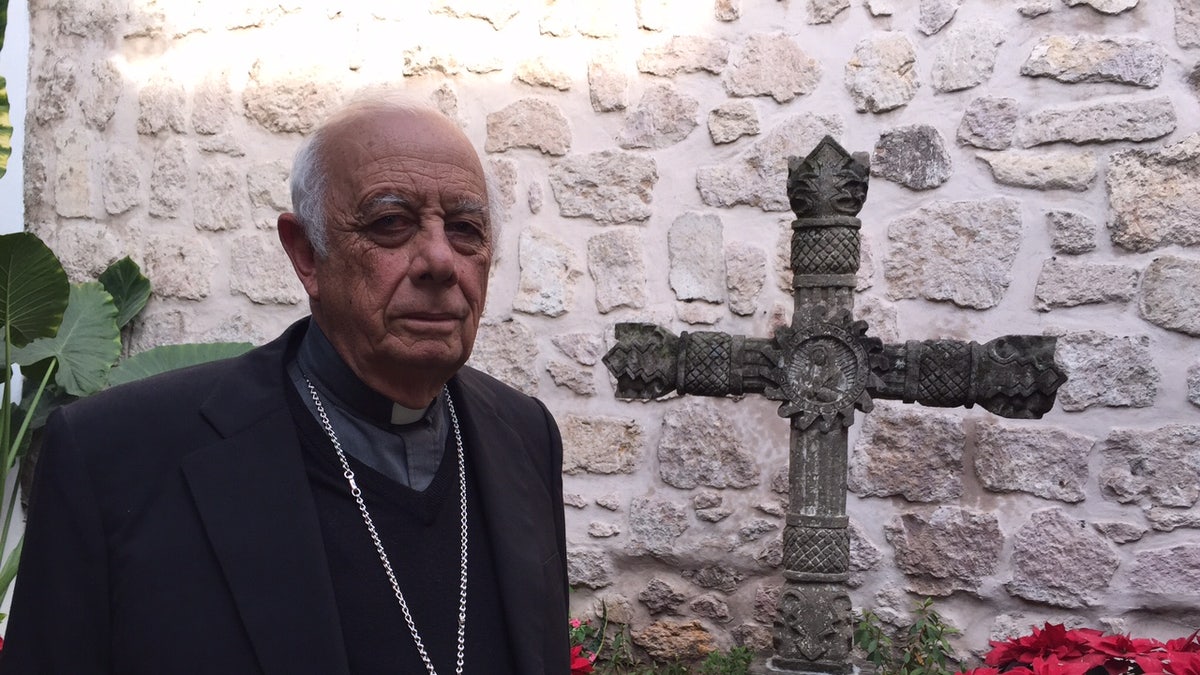
Cardinal-designate Alberto Suarez Inda of Morelia, Mexico lives in a place that has been wracked by drug cartel violence. (David Agren)
MORELIA, MEXICO – Archbishop Alberto Suárez Inda of Morelia – capital of the oft-conflictive state of Michoacán – wanted to retire one year ago. He submitted his resignation Jan. 30, 2014, upon turning 75, as per church policy. Pope Francis had other ideas, however, and promoted him to cardinal instead.
“A priest in Morelia called me … ‘I’m listening to Vatican Radio. The pope just announced your name,’ Suárez told Fox News Latino in an interview. “I told him, ‘It’s not possible. I don’t believe it.’ I must be dreaming. The [papal] nuncio called me 10 minutes later.”
Suarez’s elevation surprised many in Mexico, where the country’s three cardinals traditionally come from the country’s three largest cities – Mexico City, Guadalajara and Monterrey – not strife-stricken states such as Michoacán. But it showed Pope Francis’ preference for appointing prelates from peripheral places as he overhauls the Catholic Church and attempts to revive its relevance in heavily Catholic Latin America. He also elevated bishops in distant dioceses such as David in Panama and Tucumán in Argentina.
Suárez could only speculate on why he was elevated to cardinal – he’ll be installed on Saturday – but suggested the struggles in Michoacán with outward migration (more than 1 million Michoacanos have moved to the United States) and ongoing issues with insecurity were top priorities for Pope Francis.
“It’s a sad phenomenon that is not exclusive to Michoacán,” Suárez said of the violence. “But here it’s getting worse due to some strong groups.”
Other observers say the appointment was political and meant to send a message to Mexican officials: the Vatican was concerned about insecurity and attacks on priests and would start speaking out strongly.
“It recognizes (Suárez’s) work in a conflict area,” says Bernardo Barranco, an academic and church analyst in Mexico City.
“The role of the Catholic church as a peacemaker in Michoacán has been strengthened with the elevation of the archbishop of Morelia to cardinal,” says Andrew Chesnut, religious studies professor at Virginia Commonwealth University, who has done research in Michoacán.
“Pope Francis has and other high ranking officials have denounced the ‘culture of death’ pervading Mexico, and Michoacán has been the epicenter of the drug war.”
Violence blamed on drug cartels and organized crime has cost more than 100,000 lives over the last decade, despite an ongoing government crackdown. It’s hit hard in Michoacán, where the then-President Felipe Calderón first sent federal forces in December 2006 to take down a drug cartel known as La Familia Michoacana (now Knights Templar), which is known for promoting a quasi-religious rhetoric and making methamphetamines while condemning drug use.
In spite of the violence, senior clergy have kept criticisms somewhat subdued, preferring not to upset cartel leaders or politicians in a country where church participation in politics is still technically prohibited.
That posture appears to be changing, according to observers, as Pope Francis pushes priests to challenge authorities and the church suffers attacks against its own.
Eight priests have been killed in Mexico over the past two years, according to the Centro Católico Multimedial. They include Father Gregorio López Gorostieta, who was hauled out of a seminary at gunpoint in the state of Guerrero. He was found dead on Christmas day.
Five priests have been killed in Michoacán over the past 15 years, for reasons ranging from denouncing drug dealers to refusing to baptize the children of known cartel leaders, says Father José Luis Segura, parish priest in a the town of La Ruana – where a movement of vigilantes started to fend off crimes such as extortion and kidnapping committed by Knights Templar.
The vigilante groups won support from parish priests, who helped them organize in some towns and would let them ring the church bells in times of emergency. The groups have since been legalized by the federal government, though critics like Father Segura say the authorities didn’t do background checks and allowed many ex-members of Knights Templar to get guns and badges.
“There was a sense of being fed up. … The government didn’t act. There were people of good will who were defending their community,” Suárez said of the vigilantes. But now, “It’s a group here, a group there and they become enemies and fight among themselves because they want to control (crime) territories.”
Suárez has spoken critically of the security situation in Michoacán and government, though observers say he gets along well with all sides in a badly divided state and politicians seek out photo ops with him every election cycle.
“They look for me. It’s my obligation to listen to them,” he says of the politicians. “I’ll give some advice. Give them a document from the pope. Hopefully they read it.”
